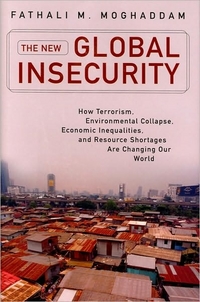

Purchase
How Terrorism, Environmental Collapse, Economic Inequalities, and Resource Shortages Are Changing Our World
Praeger Security International
February 2010
On Sale: January 22, 2010
199 pages
ISBN: 0313365075
EAN: 9780313365072
Hardcover
Add to Wish List
Non-Fiction
The New Global Insecurity: How Terrorism, Environmental
Collapse, Economic Inequalities, and Resource Shortages Are
Changing Our World explores insecurity arising out of
accelerating globalization. In this unique and
forward-thinking work, psychologist Fathali M. Moghaddam,
director of the Conflict Studies Program at Georgetown
University, explains how and why worldwide insecurity is
rising and what steps we must take to quell or reverse that
insecurity to make the future of the world more
peaceful. The book first analyzes the elements
and roots of global insecurity, discussing it in relation to
terrorism, torture, economic instability, threatened
identity, and religious fundamentalism. It then puts forward
a new model for understanding security, wherein Òsoft
security capitalÓ serves as the enabling condition for Òhard
security capital.Ó Finally, the current policies for
managing diversity, "multiculturalism" and "assimilation"
are both rejected in favor of an exciting new
policy—"omniculturalism". Drawing on his years of study and
expertise, Moghaddam likewise proposes a new policy for
better managing intergroup relations in an insecure age.
Comments
No comments posted.
Registered users may leave comments.
Log in or register now!
| 


 © 2003-2025 off-the-edge.net
all rights reserved Privacy Policy
© 2003-2025 off-the-edge.net
all rights reserved Privacy Policy